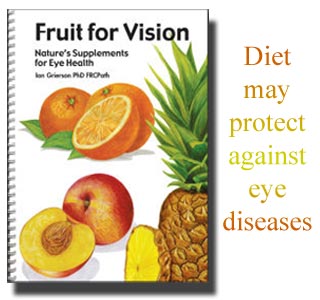
It is stated that Age-related Macular Degeneration (AMD) is the leading cause of blindness in the U.K. Failure of cells in the macular, which is the light sensitive membrane at the centre of the retina, leads to a gradual loss of central vision which in turn results in the formation of this disease. A huge number of patients afflicted with this condition, suffer from the “dry†form of the disease, for which at present there are no cures available.
Ian Grierson, Head of Ophthalmology, University of Liverpool, has put together a wide-ranging cooking guide to add to the amount of the daily fruits and vegetables intake. The cooking guide “Fruit for Vision,†may prove to be helpful to the age-related macular degeneration patients by providing them with recipes to add more fruits, vegetables and nuts in their diet which will in turn slow down the degeneration process.
“Poor eating habits have a huge impact on health in general and the health of your eyes is no exception. Eye problems such as AMD, cataract and even glaucoma can all be affected by what we eat. But a relatively minor change in diet – adding a little more fruit into our meals – can make a profound difference and can keep eye diseases like AMD at bay for up to 20% longer. There are of course other risk factors related to AMD such as age, light exposure, smoking and being overweight. But if we can improve the kind of food that we eat, we could dramatically reduce the number of people who may suffer from eye diseases in the future,†says Professor Grierson.
The recipes in the “Fruit and Vision†will aid age-related macular degeneration patients in increasing the amount of micronutrient, vitamin and antioxidant intake in their diet. This book is also recommended for use by those people who are not suffering from this condition. Non-sufferers can also utilize this book to add more nuts, vegetables and fruits in their daily diet which may in turn shield them from this disease.
The recipes in this book are easy to make and include the addition of these healthy food items without bringing about a change in lifestyle. This book recommends small additions to the stuff that is normally consumed, like peaches with ham, ginger with melon, etc. It does not suggest major dietary changes, and thus can be easily included in one’s daily diet.
